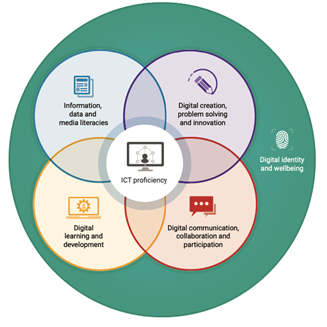New Voices RGU Student Series – Emma Grey
Category: New Voices, New Voices, RGU Student Series
In the Robert Gordon University Student Series blog, we share the views of RGU students from the MSc in Information and Library Studies course.
Today, we hear from Emma Grey, a part-time online student on the MSc Information and Library Studies RGU course. Emma works full-time as an editor and enjoys gardening, reading, and stargazing. Her professional interests are digital inclusion, tackling misinformation, and addressing inequalities.
In this blog, Emma discusses the pivotal work of public libraries to promote digital literacy during the pandemic, and the importance of libraries remaining responsive to their communities’ changing needs.
Learning from Lockdown: Libraries, Digital Literacy and Resilience
Digital literacy is defined by the International Federation of Library Associations and Institutions (IFLA) as the ability to “use technology to its fullest effect — efficiently, effectively and ethically — to meet information needs in personal, civic and professional lives” (IFLA 2017). These abilities range from basic skills, such as word processing and e-banking capabilities, to knowledge of cybersecurity and less technical aspects, such as “ethical knowledge and global citizenship” (IFLA 2017). Digital literacy is a “lifelong learning process” (IFLA 2017), the importance of which has been starkly highlighted by the rapid transition to a predominantly digital life necessitated by the global COVID-19 pandemic. Overnight, it became essential to not only work, learn and socialise online, but also to access public health information and healthcare services remotely in order to control the spread of COVID-19.
The urgent necessity of putting measures in place to aid the development of digital skills was recently stressed by the Chartered Institute of Library and Information Professionals (CILIP) in their call to the Government to “work with us to bring forward a public programme of support for health, digital and information literacy, so that individual citizens can be empowered to make informed choices both about their own welfare and the safety of those around them” (CILIP 2020). Within a post-COVID-19 environment, public libraries will play a key role in this empowerment. In order to do this, librarians and information professionals will draw upon their existing expertise in digital literacy while simultaneously embracing new opportunities. This will assist in enabling individuals to access services and thereby reduce social isolation while minimising the risk of increasing inequalities.
Adapting Services
When lockdown rapidly increased the demand for access to digital resources, librarians and information professionals quickly adapted their services to meet needs. The transformation of physical exchanges into virtual interactions proved the importance of the competencies of digital communication, collaboration and participation.
As outlined in the Jisc digital capabilities framework, these are the abilities to
- “communicate effectively in digital media and spaces”
- “participate in digital teams”
- “collaborate effectively using shared digital tools”
- “produce shared materials”
- “build digital networks [and] create positive connections” (Jisc 2019).
As we become increasingly dependent upon technology to communicate with each other, collaborate within and across organisations, and participate in the world, these competencies will be more important than ever in addressing a post-COVID legacy which may require a continuation of virtual services for quite some time.
While there are excellent examples of the use of these competencies in numerous Scottish libraries, one of particular note is the digital offering from Inverclyde Libraries. Through the use of digital technologies, library staff have held bi-weekly live Bookbug sessions which were streamed via Facebook and weekly Crafternoon sessions which encouraged children to take part in easy arts and crafts projects (Nolan 2020). Through collaboratively sharing information with Early Learning Centres and primary school teachers in the local area, relevant topic areas were chosen for the sessions. Online book groups were held for teenagers and, importantly, all books discussed were available through Borrowbox, an eBook and eAudiobook app which is free for anyone with a library membership (Nolan 2020). Adaptations to services and the use of digital competencies such as these are essential in order to enable individuals and communities to continue to engage with services which contribute to wellbeing, enhance lifelong skills and support social inclusion (Fujiwara, Lawton and Mourato 2015).
Collective Responsibility
COVID-19 and the subsequent lockdown intensified many current inequalities and unfortunately facilitated the creation of new societal divisions, for example, between those who can work from home and those who cannot (Blundell et al. 2020). It remains to be seen what the legacy of the virus will be, but it is clear that it will involve further challenges for inequality in relation to health, poverty, public services and employment opportunities. A multi-agency approach to tackling these inequalities is imperative, and library services can play a meaningful role in creating a more equitable society in which opportunities for advancement are available to everyone, and not just those fortunate enough to possess the skills and equipment necessary. If information professionals have the digital skills and resilience required to adapt to the changing environment — particularly when we consider what public libraries could look like going forward, given the inevitability of budget savings — then we will be ready to respond to our service users’ needs and to play our part in collectively supporting our communities.
References
BLUNDELL, R. et al., 2020. COVID-19 and inequalities. Fiscal Studies, 41(2), pp. 291-319.
CHARTERED INSTITUTE OF LIBRARY AND INFORMATION PROFESSIONALS, 2020. CILIP Statement on new COVID-19 provisions. [online]. London, UK: CILIP. Available from: https://www.cilip.org.uk/news/news.asp?id=536506) [Accessed 30 November 2020].
FUJIWARA, D., LAWTON, R. AND MOURATO, A., 2015. The health and wellbeing benefits of public libraries. [online]. Newcastle upon Tyne: Arts Council England. Available from: https://www.artscouncil.org.uk/health-and-wellbeing-benefits-public-libraries [Accessed 27 November 2020].
INTERNATIONAL FEDERATION OF LIBRARY ASSOCIATIONS AND INSTITUTIONS, 2017. IFLA Statement on Digital Literacy (18 August 2017). The Hague, NL: IFLA. [online]. Available from: https://www.ifla.org/publications/node/11586. [Accessed 26 November 2020].
JISC, 2019. Jisc digital capabilities framework: The six elements defined. [online]. Bristol, UK: Jisc. Available from: https://repository.jisc.ac.uk/7278/1/BDCP-DC-Framework-Individual-6E-110319.pdf [Accessed 30 November 2020].
NOLAN, A., 2020. Inverclyde Libraries – COVID Response. [online]. 16 November 2020. Available from: https://scottishlibraries.org/about-us/news/inverclyde-libraries-covid-response/ [Accessed 30 November 2020].

